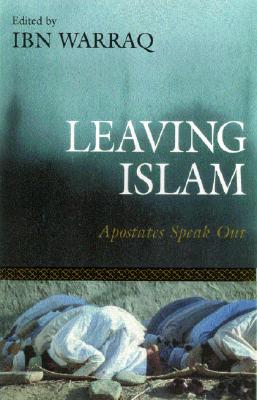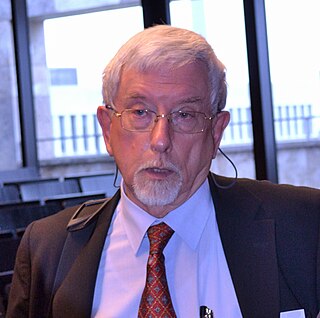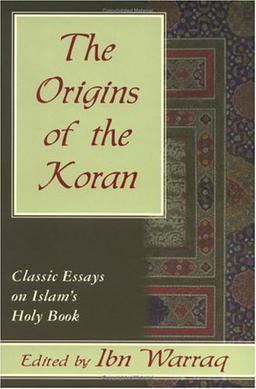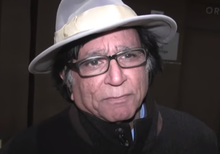
The Quran, also romanized Qur'an or Koran, is the central religious text of Islam, believed by Muslims to be a revelation from God. It is organized in 114 chapters which consist of individual verses. Besides its religious significance, it is widely regarded as the finest work in Arabic literature, and has significantly influenced the Arabic language.
John Edward Wansbrough was an American historian of Islamic origins and Quranic studies and professor who taught at the University of London's School of Oriental and African Studies (SOAS), where he was vice chancellor from 1985 to 1992.

Why I Am Not a Muslim, a book written by Ibn Warraq, is a critique of Islam and the Qur'an. It was first published by Prometheus Books in the United States in 1995. The title of the book is a homage to Bertrand Russell's essay, Why I Am Not a Christian, in which Russell criticizes the religion in which he was raised.

The Myth of Islamic Tolerance: How Islamic Law Treats Non-Muslims is a collection of 63 essays edited by Robert Spencer. It deals with the history of non-Muslim populations during and after the conquest of their lands by Muslims.

Leaving Islam: Apostates Speak Out is a 2003 book, authored and edited by ex-Muslim and secularist Ibn Warraq, that researches and documents cases of apostasy in Islam. It also contains a collection of essays by ex-Muslims recounting their own experience in leaving the Islamic religion.
The historiography of early Islam is the secular scholarly literature on the early history of Islam during the 7th century, from Muhammad's first purported revelations in 610 until the disintegration of the Rashidun Caliphate in 661, and arguably throughout the 8th century and the duration of the Umayyad Caliphate, terminating in the incipient Islamic Golden Age around the beginning of the 9th century.
Prometheus Books is a publishing company founded in August 1969 by the philosopher Paul Kurtz. The publisher's name was derived from Prometheus, the Titan from Greek mythology who stole fire from Zeus and gave it to man. This act is often used as a metaphor for bringing knowledge or enlightenment.
Criticism of Islam, including of Islamic beliefs, practices, and doctrines, can take many forms, including academic critiques, political criticism, religious criticism, and personal opinions.

Gerd Rüdiger Puin is a German scholar of Oriental studies, specializing in Quranic palaeography, Arabic calligraphy and orthography. He was a lecturer of Arabic language and literature at Saarland University in Saarbrücken, Germany. In regards to his approach of historical research, Puin is considered a representative of the "Saarbrücken School", which is part of the Revisionist School of Islamic Studies.

The Origins of The Koran: Classic Essays on Islam’s Holy Book is a 1998 book edited by Ibn Warraq. It contains a collection of 13 critical studies of the Qur'an written over the past two centuries by historians and scholars of the Middle East: Ibn Warraq, Theodor Nöldeke, Leone Caetani, Alphonse Mingana, Arthur Jeffery, David Samuel Margoliouth, Abraham Geiger, William St. Clair Tisdall, Charles Cutler Torrey and Andrew Rippin. Most of these authors wrote their essays on the Qur'an before World War II (1939–1945).
William St. Clair Tisdall (1859–1928) was a British Anglican priest, linguist, historian and philologist who served as the Secretary of the Church of England's Missionary Society in Isfahan, Persia.

The Syro-Aramaic Reading of the Koran: A Contribution to the Decoding of the Language of the Koran is an English-language edition (2007) of Die syro-aramäische Lesart des Koran: Ein Beitrag zur Entschlüsselung der Koransprache (2000) by Christoph Luxenberg.
The Quran is viewed to be the scriptural foundation of Islam and is believed by Muslims to have been sent down by Allah (God) and revealed to Muhammad by the angel Jabreel (Gabriel). The Quran has been subject to criticism both in the sense of being the subject of an interdisciplinary field of study where secular, (mostly) Western scholars set aside doctrines of its divinity, perfection, unchangeability, etc. accepted by Muslim Islamic scholars; but also in the sense of being found fault with by those — including Christian missionaries and other skeptics hoping to convert Muslims — who argue it is not divine, not perfect, and/or not particularly morally elevated.
The historicity of Muhammad refers to the study of Muhammad as a historical figure and critical examination of sources upon which traditional accounts are based.

What the Koran Really Says: Language, Text and Commentary (2002) is a book edited by Ibn Warraq and published by Prometheus Books. The book is a collection of classical essays, some translated for the first time, that provide commentary on the traditions and language of the Koran, discussing its grammatical and logical discontinuities, its Syriac and Hebrew foreign vocabulary, and its possible Christian, Coptic and Qumranic sources. The title is taken from German author Manfred Barthel's 1980 book Was wirklich in der Bibel steht.
Christian influences in Islam can be traced back to Eastern Christianity, which surrounded the origins of Islam. Islam, emerging in the context of the Middle East that was largely Christian, was first seen as a Christological heresy known as the "heresy of the Ishmaelites", described as such in Concerning Heresy by Saint John of Damascus, a Syriac scholar.
This is a bibliography of literature treating the topic of criticism of Islam, sorted by source publication and the author's last name.
The revisionist school of Islamic studies is a movement in Islamic studies that questions traditional Muslim narratives of Islam's origins.
Abu Ubaid al-Qasim ibn Sallam al-Khurasani al-Harawi was an Arab philologist and the author of many standard books on lexicography, Qur’anic sciences, hadith, and fiqh.








